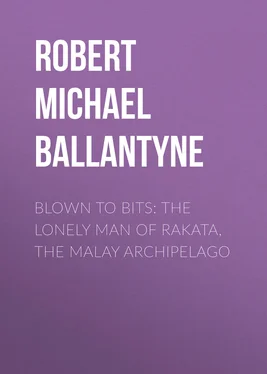Robert Michael Ballantyne - Blown to Bits - The Lonely Man of Rakata, the Malay Archipelago
Здесь есть возможность читать онлайн «Robert Michael Ballantyne - Blown to Bits - The Lonely Man of Rakata, the Malay Archipelago» — ознакомительный отрывок электронной книги совершенно бесплатно, а после прочтения отрывка купить полную версию. В некоторых случаях можно слушать аудио, скачать через торрент в формате fb2 и присутствует краткое содержание. Жанр: foreign_children, literature_19, foreign_antique, foreign_prose, на английском языке. Описание произведения, (предисловие) а так же отзывы посетителей доступны на портале библиотеки ЛибКат.
- Название:Blown to Bits: The Lonely Man of Rakata, the Malay Archipelago
- Автор:
- Жанр:
- Год:неизвестен
- ISBN:нет данных
- Рейтинг книги:5 / 5. Голосов: 1
-
Избранное:Добавить в избранное
- Отзывы:
-
Ваша оценка:
- 100
- 1
- 2
- 3
- 4
- 5
Blown to Bits: The Lonely Man of Rakata, the Malay Archipelago: краткое содержание, описание и аннотация
Предлагаем к чтению аннотацию, описание, краткое содержание или предисловие (зависит от того, что написал сам автор книги «Blown to Bits: The Lonely Man of Rakata, the Malay Archipelago»). Если вы не нашли необходимую информацию о книге — напишите в комментариях, мы постараемся отыскать её.
Blown to Bits: The Lonely Man of Rakata, the Malay Archipelago — читать онлайн ознакомительный отрывок
Ниже представлен текст книги, разбитый по страницам. Система сохранения места последней прочитанной страницы, позволяет с удобством читать онлайн бесплатно книгу «Blown to Bits: The Lonely Man of Rakata, the Malay Archipelago», без необходимости каждый раз заново искать на чём Вы остановились. Поставьте закладку, и сможете в любой момент перейти на страницу, на которой закончили чтение.
Интервал:
Закладка:
“What you want wi’ me , sar?” he asked.
“Well, upon my word,” said Nigel, somewhat perplexed, “I can’t very well say. I suppose something must have been in my mind, but—anyhow, I felt a desire to have a talk with you; that is, if you can spare the time.”
The first part of this reply induced a slight recurrence of the frown and pout, but at its conclusion the black brow cleared and the mouth expanded to such a gum-and-teeth-exposing extent that Nigel fairly burst into a laugh.
“You’s bery good, sar,” said the man, “an’ I’s hab much pleasure to make your acquaintance.—Der an’t no grease on ’em now.”
The last remark had reference to the enormous black paw which he held out.
Nigel at once grasped it and shook it heartily.
“I’s bery fond ob a talk, sar,” continued the negro, “so as you wants one, heabe ahead.”
Thus encouraged, our hero began by remarking that he seemed to be preparing for a trip.
“Dat’s zackly what I’s a-doin’, sar.”
“A long one?”
“Well, dat depends on what you call short. Goin’ to Sunda Straits, which p’raps you know, sar, is nigh a hundred miles fro’ here.”
“And what may you be going to do there?” asked Nigel.
“Goin’ home to Krakatoa.”
“Why, I thought that was an uninhabited island. I passed close to it on my way here, and saw no sign of inhabitants.”
“Dat’s cause I was absint fro’ home. An’ massa he keeps indoors a good deal.”
“And pray who is massa?” asked Nigel.
“Sar,” said the negro, drawing up his square sturdy frame with a look of dignity; “fair-play is eberyt’ing wid me. You’ve ax me a heap o’ questions. Now’s my turn. Whar you comes fro’?”
“From England,” replied Nigel.
“An’ whar you go to?”
“Well, you’ve posed me now, for I really don’t know where I’m going to. In fact that is the very thing I have been trying to find out all day, so if you’ll help me I’ll be much obliged.”
Here Nigel explained his position and difficulties, and it was quite obvious, judging from the glittering eyes and mobile mouth, that he poured his tale into peculiarly sympathetic ears. When he had finished, the negro stood for a considerable time gazing in meditative silence at the sky.
“Yes,” he said at last, as if communing with himself, “I t’ink—I ain’t quite sure, but I t’ink—I may ventur’.”
“Whatever it is you are thinking about,” remarked Nigel, “you may venture to say anything you like to me .”
The negro, who, although comparatively short of stature, was Herculean in build, looked at the youth with an amused expression.
“You’re bery good, sar, but dat’s not what I’s t’inkin’ ob. I’s t’inkin’ whedder I dar’ ventur’ to introdoce you to my massa. He’s not fond o’ company, an’ it might make ’im angry, but he came by a heaby loss lately an’ p’raps he may cond’send to receibe you. Anyhow you’d be quite safe, for he’s sure to be civil to any friend ob mine.”
“Is he then so fierce?” asked Nigel, becoming interested as well as amused.
“Fierce! no, he’s gentle as a lamb, but he’s awrful when he’s roused—tigers, crokindiles, ’noceroses is nuffin’ to him!”
“Indeed! what’s his name, and what does he do? how does he live?”
The negro shook his head. “Da’s more’n I dar tell till I ax his leave, sar. I kin only say de peepil around calls ’im the hermit ob Rakata, ’cause he libs by his-self (wid me, ob course, but I counts for nuffin’), close under de ole volcano ob Krakatoa. Dey tink—some ob de foolish peepil—dat he hab sold his-self to de dibil, but I knows better. He’s a good man, and you’d hab great fun if you stop wid him. Now, what I’s a-gwine to advise you is, come wid me an’ see de hermit. If he lets you stop, good. If not, I fetch you ober to de main land—whar you please—an’ you kin come back here or go whar you choose. Its wort’ your while to take your chance, anyhow.”
The negro said this with such an earnest look that Nigel made up his mind on the spot to accept this curious invitation.
“I’ll go!” he exclaimed with sudden energy. “When do you start?”
“To-morrer at daybreak, sar.”
“Well, I shall have to talk it over first with my father, but I’m sure he won’t object, so you may look out for me here at daybreak. Shall I have to fetch any provisions with me for the voyage?”
“No, nuffin’. Boat’s crammed wi’ grub. But you’d better bring a gun o’ some sort an’ a ’volver, an’ a big knife, an’ a mortal big appetite, for a man’s no good widout dat.”
“I always carry that about with me,” said the youth, “whatever else I may leave behind; and I’ll see to the other things.—By the way, what’s your name?”
“Moses.”
“Is that all?”
“Isn’t dat enuff?” returned the negro with a look of dignity.
“Quite; but I have the advantage of you there, Moses, for I have two names—Nigel Roy.”
“Well, I don’t see much use ob two, but which does you like to be called by—Nadgel or Roy?”
“Whichever you please, Moses; I’ll answer to either. So now, good-bye for the present, and look out for me to-morrow at daylight.”
“Good-bye, Massa Nadgel, till to-morrer.”
The negro waved his hand and, sauntering slowly back to his boat, remarked in an undertone, “I lub dat young feller!” Saying which, he resumed his greasing operations.
Of course Captain Roy made no objection to his son’s proposal, though he freely gave his opinion that it was a wild-goose chase.
“However, lad, please yourself and you’ll please me,” he added; “and now, be particular to bear in mind that you’ve got to write to me every time you get within hail of a post-office or a passing ship or steamer that may chance to be comin’ this way, and in each letter be sure to tell me where you’re goin’ to next, so as I may send a letter there to you in case I want you to return sudden or otherwise. We mustn’t lose touch, you see. You needn’t write long screeds. I only want to know your whereabouts from time to time. For the rest—you can spin it out in yarns when you come back.”
Chapter Six
The Hermit of Rakata Introduced
Nothing worthy of particular note occurred during the boat-voyage along the northern shore of Java to Sunda Straits. A fair, steady breeze wafted them westward, and, on the morning of the third day, they came in sight of the comparatively small uninhabited island of Krakatoa.
The boat in which they voyaged, although a little one, had a small portion of the bow decked over, so that our hero and his sable friend could find shelter from the night air when disposed to sleep, and from the fierce rays of the sun at noon.
By the advice of his father, Nigel had changed his sailor costume for the “shore-goin’ toggery” in which he had landed on the Keeling Islands, as being more suitable to his new character as a traveller, namely, a white cloth cap with a peak in front and a curtain behind to protect his neck, a light-grey tunic belted at the waist, and a pair of strong canvas trousers. He had also purchased an old-fashioned double-barrelled fowling-piece, muzzle-loading and with percussion locks.
“For you see, Nigel,” the captain had said, “it’s all very well to use breech-loaders when you’ve got towns and railways and suchlike to supply you wi’ cartridges, but when you’ve got to cruise in out-o’-the-way waters, there’s nothin’ like the old style. It’s not difficult to carry a few thousand percussion-caps an’ a bullet-mould about wi’ you wherever you go. As to powder, why, you’ll come across that ’most everywhere, an’ lead too; and, for the matter o’ that, if your life depended on it you could shove a handful of gravel or a pen-knife or tooth-pick into your gun an’ blaze away, but with a breech-loader, if you run out o’ cartridges, where are you?”
Читать дальшеИнтервал:
Закладка:
Похожие книги на «Blown to Bits: The Lonely Man of Rakata, the Malay Archipelago»
Представляем Вашему вниманию похожие книги на «Blown to Bits: The Lonely Man of Rakata, the Malay Archipelago» списком для выбора. Мы отобрали схожую по названию и смыслу литературу в надежде предоставить читателям больше вариантов отыскать новые, интересные, ещё непрочитанные произведения.
Обсуждение, отзывы о книге «Blown to Bits: The Lonely Man of Rakata, the Malay Archipelago» и просто собственные мнения читателей. Оставьте ваши комментарии, напишите, что Вы думаете о произведении, его смысле или главных героях. Укажите что конкретно понравилось, а что нет, и почему Вы так считаете.












